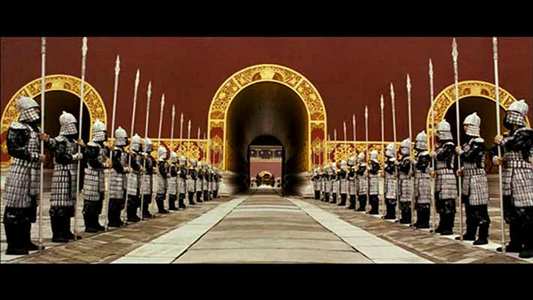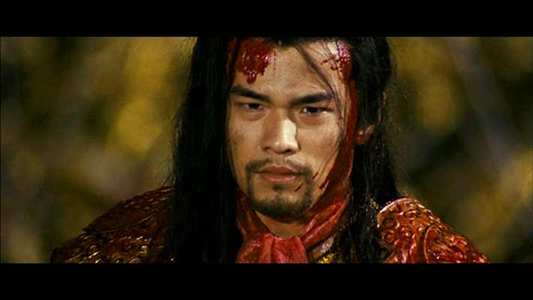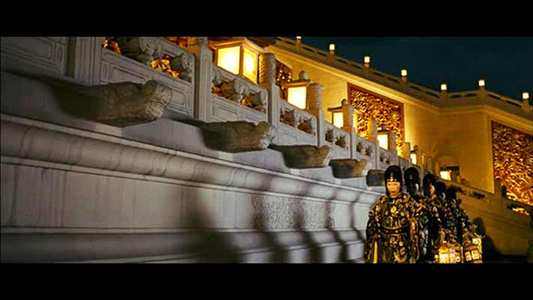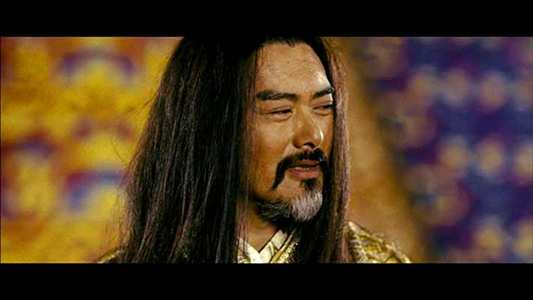Review of Curse of the Golden Flower
Introduction
It`s thanks to Sony making the decision to open `Crouching Tiger, Hidden Dragon` like it would open a summer blockbuster back in 2000 that Asian cinema is experiencing a, albeit minor, renaissance in the west. Someone (who deserves a pay rise if they didn`t already get one) came up with the idea not to simply limit it to art-house Odeons and allow it to be buoyed by the festival circuit and word of mouth alone, but to act as if it was the must-see popcorn-chomper of the year and produce a media blitz worthy of the latest Bruce Willis actioner. And hey, it worked as it was the first foreign language film to bust through the $100,000,000 barrier at the US box office, and it`s still the highest grossing.
The sublime mix of frenetic action, brilliantly choreographed swordplay and epic plot paved the way for others to follow in Ang Lee`s footsteps, not least of which Zhang Yimou. While many Asian properties sat gathering dust on US shelves as executives shrugged and sighed over what to do with them (and still do), it only took 2 years of shelf-warming at Miramax (and an interjection from QT) before Yimou`s `Hero` made it to American theatres. Like `Crouching Tiger`, it was a sweeping and colourful spectacle that closed with a highly respectable gross and much acclaim. Compared to his Jet-Li-starring launch vehicle, his follow-up, `House of Flying Daggers` was a more modest success, but was still a definite critical hit.
Despite this, his latest period epic `Curse of the Golden Flower` met with a luke-warm response, mixed reviews and a disappointing return in the US. The UK opening didn`t follow until a full 5-months later, and stories of yawning punters walking out within the first 30-minutes are commonplace. While logic would lead you to believe Zhang Yimou had lost his touch and simply can`t match the quality of his international breakthrough and its follow-up, the truth is that people walked into cinemas expecting death-defying wirework and martial arts galore, and what they got was a very different kind of animal indeed.
In 10th Century China, the imperial family appear to be everything the first family of the Empire should be. But underneath the facade lies a complex web of hate, lust, intrigue and political ambition that threatens to tear the family, and the country, apart. The Emperor (Chow Yun-Fat) is slowly poisoning his wife the Empress (Gong Li) and driving her insane with the aide of the imperial doctor, she in turn is having an affair with her stepson and the Emperor`s eldest and the three sons are either having illicit romances with the help or getting ready to stab each other in the back for the crown. But after a mysterious woman breaks into the palace and reveals to the Empress the truth of her husband`s underhanded doings, a chain of events is set off that leads to dark family secrets being unearthed, innocents being slaughtered and the emergence of a political coup which threatens the very fabric of the country.

Video
Anamorphic 2.35:1, and in all honesty, the transfer is neither as sharp nor as vibrant as its 2006 vintage and heritage would suggest. There`s a touch of noise here and there and some mottling in the backgrounds, but generally there`s just a look about the slightly washed out transfer that says it`s not as clean or as fresh looking as it could be. On the other hand, as you would expect, the costumes, sets and art direction can be summed up in a single word: stunning. The sets in particular must surely be the most extravagant ever committed to film, and the attention to detail throughout is astonishing.

Audio
A fantastic Dolby Digital 5.1 in native Mandarin is accompanied by a stereo option. The surround track is almost shyly reserved at times, freeing it from the overuse of gimmickry with the soundstage. Ambience is handled superbly, the sub kicks and hollers like a cave-dwelling monster and when the rears are in use, they`re put to a restrained effect that, while adding to the sense of being drawn into the action by having swords slash and arrows fly past your head, doesn`t oversaturate the audio with an abundance of flashy directional effects. It`s all wrapped up in a gorgeous score from Shigeru Umebayashi which subtlety blends an overtly western influence into classical Chinese orchestration.

Features
Straightforward EPK stuff, I`m afraid. There`s a 20-minute behind the scenes, complete with a gruff, introductory voiceover straight out of `The A-Team` credits, two tiny 4-minute featurettes on Chow Yun-Fat and Gong Li`s characters which are, somewhat insultingly, subtitled (especially considering Gong Li speaks beautifully fluent English); but that`s American EPKs for you. There`s also a couple of trailers, both teaser and theatrical, and a rolling photo gallery that pleasantly slideshows along to the film`s score.

Conclusion
`Curse of the Golden Flower` starts off a little slow. Its languid pace and over the top visuals present a hazy, dreamlike feature that, for a while, seems like it won`t pull you in, and its characters, initially, seem distancing. It`s wrapped up in the showiness of the whole affair, yet missing something key - the flamboyance of the action and performers from Yimou`s previous films are absent, and with so much time spent taking in the scenery, you wonder if it`s even starting to build a plot. Chow Yun-Fat looks beard-strokingly menacing, and Gong Li crazy beautiful, but initial impressions: `Curse of the Golden Flower` - lavish, but ultimately a little dull. Then something happens. A small scene between the Empress and a late night visitor with a story to tell. And it all changes. What at first seemed like an exercise in obtuse period drama turns into a grand, sweeping, melodramatic piece with a cleverly and intricately detailed plot and wonderfully bitter overtone. By jove, I think we just witnessed character building.
Everything that follows lives up to the standard that Zhang Yimou set with `Hero` and followed up with in `House of Flying Daggers`, and in some respects - particularly the way the plot opens up frequently and reveals another dimension or angle to consider in this sprawling family saga - surpasses them. What it immediately lacks in punch, flair and excitement it makes up with vivid human drama; this time they`re people, not flying chop-socky practitioners. Chow Yun-Fat is at his most intense as the menacing tyrant, but it`s Gong Li who constantly raises the acting stakes with an incredible performance full of pathos, actually making this powerful woman a sympathetic human character as opposed to simply a loopy cipher in a downward spiral. Yes, the acting really is particularly standout, but it`s backed by a fantastic script that somehow manages to juggle the drama with some crazy fight scenes and never makes it feel stitched together.
What a bunch of fight scenes they are too. Not simply in terms of their scale (so big and ambitious you can see the seams in the CGI), but in the emotional weight behind them. There isn`t a single action scene in the film`s second half that doesn`t have dramatic repercussions, and it feeds a real awareness of the consequences to the viewer. They`re, of course, impressive in their choreography and the measure of performance, but it`s how strongly they make us relate to what we`ve seen come before that`s the killer. It`s a wonderful film that so many just didn`t seem to get, and, aside from the attention deficit disorder lot who couldn`t suffer a spot of characterisation in the opening act, I find it hard to understand why. Zhang Yimou will continue to make dazzling, grandiose films, many of which I`m sure will go on to leave `Curse of the Golden Flower` languishing around his CV as, to some, the grand, Chinese epic that never was. But to others, it`s undoubtedly his misunderstood masterpiece.
Your Opinions and Comments
Be the first to post a comment!